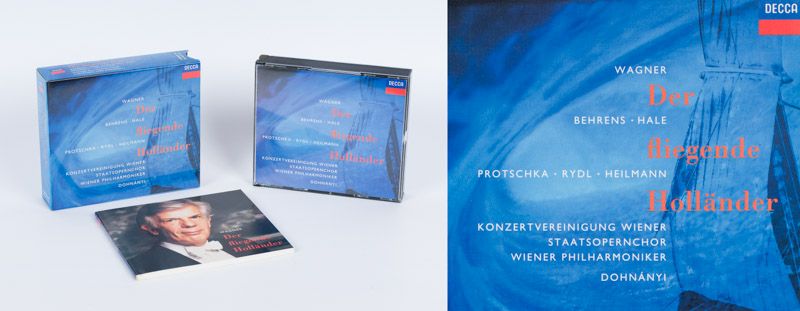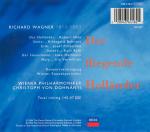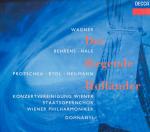Wagner, Der fliegende Holländer (The Flying Dutchman) - Behrens - Hale - Protsch
Der fliegende Holländer (The Flying Dutchman) – Behrens – Hale – Protschka – Rydl – Heilmann. Konzertvereinigung Wiener Staatsopernchor unter der Leitung von Christoph von Dohnányi.
Decca, 1994. CD Size. 2 CD’s. Original Softcover Cardboard-Box. This rare set of 2 CD’s is in excellent condition.
Der fliegende Holländer (The Flying Dutchman), WWV 63, is a German-language opera, with libretto and music by Richard Wagner. The central theme is redemption through love. Wagner conducted the premiere at the Königliches Hoftheater Dresden in 1843.
Wagner claimed in his 1870 autobiography Mein Leben that he had been inspired to write the opera following a stormy sea crossing he made from Riga to London in July and August 1839. In his 1843 Autobiographic Sketch, Wagner acknowledged he had taken the story from Heinrich Heine’s retelling of the legend in his 1833 satirical novel The Memoirs of Mister von Schnabelewopski (Aus den Memoiren des Herrn von Schnabelewopski).
This work shows early attempts at operatic styles that would characterise his later music dramas. In Der fliegende Holländer Wagner uses a number of leitmotivs (literally, “leading motifs”) associated with the characters and themes. The leitmotifs are all introduced in the overture, which begins with a well-known ocean or storm motif before moving into the Dutchman and Senta motifs.
Wagner originally wrote the work to be performed without intermission – an example of his efforts to break with tradition – and, while today’s opera houses sometimes still follow this directive, it is also performed in a three-act version. (Wikipedia)
Christoph von Dohnányi (born 8 September 1929) is a German conductor. Dohnányi was born in Berlin, Germany to Hans von Dohnanyi, a German jurist of Hungarian ancestry, and Christine Bonhoeffer. His uncle on his mother’s side, and also his godfather, was Dietrich Bonhoeffer, a Lutheran pastor and theologian/ethicist. His grandfather was the pianist and composer Erno Dohnányi, also known as Ernst von Dohnányi. His father, uncle and other family members participated in the German Resistance movement against Nazism, and were arrested and detained in several Nazi concentration camps before being executed in 1945, when Christoph was 15 years old. Dohnányi’s older brother is Klaus von Dohnanyi, a German politician and former mayor of Hamburg.
Christoph von Dohnányi made his conducting debut with The Cleveland Orchestra in December 1981 and was named “Music Director Designate” the following year. However, he would not begin his tenure as music director until 1984. During the intervening two years, the Orchestra invited a number of guest conductors to lead the ensemble, including former music director Erich Leinsdorf for six weeks of subscription concerts. Leinsdorf would remark that he was the “bridge between the regimes.” Before taking the podium as the Orchestra’s sixth music director, Dohnányi made guest appearances with other American orchestras, including those in Detroit, Pittsburgh, and New York, as well as leading The Cleveland Orchestra in its annual gala concert and recordings at Severance Hall. As Dohnányi began his first season as music director, he brought with him contacts that would push the Orchestra forward with a variety of recording projects. Near the end of the 1984-85 season, Dohnányi announced an ambitious idea: The Cleveland Orchestra would use its summer home, Blossom Music Center, to perform a fully-staged opera: Mozart’s The Magic Flute. The production, which was attended by 15,000 people, was labeled “the Ohio musical event of the summer” by The Columbus Dispatch.Dohnányi also oversaw the hiring of Indonesian-born conductor Jahja Ling, who would lead the newly-established Cleveland Orchestra Youth Orchestra, which had its first concert in February 1987.
In addition to making recording a hallmark of his tenure as music director through the Orchestra’s ongoing association with several labels (Teldec, Decca/London, and Telarc), Dohnányi focused much of his attention on international touring. In 1986, the Orchestra embarked on its sixth tour of Europe and its first international tour under Dohnányi, performing twenty-one concerts in seventeen cities across Western Europe. Not only would the Orchestra continue with international touring to Europe or East Asia nearly every season, it would also embark on tours of European festivals, including the Salzburg Festival, where the Orchestra’s long-standing relationship would begin after a performance in 1990. Because of the departure or retirement of several musicians between 1988 and 1990, Dohnányi was tasked with hiring new Orchestra members, including a replacement for Robert Page, who had been the longtime director of the Cleveland Orchestra Chorus. Furthermore, Leonard Slatkin, the former music director of the St. Louis Symphony, was appointed Blossom Festival Director beginning in the summer of 1991.
To celebrate The Cleveland Orchestra’s 75th anniversary, Dohnányi led performances of Richard Wagner’s Ring cycle at Severance Hall during the 1992–93 and 1993-94 seasons. Although the ensemble’s intention was to become the first symphony orchestra in the United States to record the four-opera, fifteen-hour musical monument, financial restrictions limited the Orchestra to recording only the first two operas — Das Rheingold and Die Walküre.
In 1992, Dohnányi signed a new contract that extended his tenure as music director through the 1999-2000 season. A few years later, the Orchestra began a fundraising campaign for the renovation of Severance Hall, which included the removal of the “Szell Shell,” a return of the E.M. Skinner organ to the stage, and an expansion of internal facilities to enhance the experience of concertgoers. Dohnányi signed his final contract as music director with the Orchestra in 1997, extending his tenure until 2002.
As international touring continued, the Orchestra visited the People’s Republic of China for the first time in 1998. During the spring of 1999, the Orchestra moved to Cleveland’s Playhouse Square for a residency at the Allen Theatre until the renovation of Severance Hall was completed. On January 8, 2000, Dohnányi led a gala concert to celebrate the re-opening of Severance Hall, which was broadcast live on local television by Cleveland’s WVIZ. Dohnányi finished out his contract — eventually succeeded by Franz Welser-Möst in 2002 — and was named Music Director Laureate of The Cleveland Orchestra. (Wikipedia)
Wilhelm Richard Wagner (22 May 1813 – 13 February 1883) was a German composer, theatre director, polemicist, and conductor who is chiefly known for his operas (or, as some of his mature works were later known, “music dramas”). Unlike most opera composers, Wagner wrote both the libretto and the music for each of his stage works. Initially establishing his reputation as a composer of works in the romantic vein of Carl Maria von Weber and Giacomo Meyerbeer, Wagner revolutionised opera through his concept of the Gesamtkunstwerk (″total work of art”), by which he sought to synthesise the poetic, visual, musical and dramatic arts, with music subsidiary to drama. He described this vision in a series of essays published between 1849 and 1852. Wagner realised these ideas most fully in the first half of the four-opera cycle Der Ring des Nibelungen (The Ring of the Nibelung).
His compositions, particularly those of his later period, are notable for their complex textures, rich harmonies and orchestration, and the elaborate use of leitmotifs—musical phrases associated with individual characters, places, ideas, or plot elements. His advances in musical language, such as extreme chromaticism and quickly shifting tonal centres, greatly influenced the development of classical music. His Tristan und Isolde is sometimes described as marking the start of modern music.
Wagner had his own opera house built, the Bayreuth Festspielhaus, which embodied many novel design features. The Ring and Parsifal were premiered here and his most important stage works continue to be performed at the annual Bayreuth Festival, run by his descendants. His thoughts on the relative contributions of music and drama in opera were to change again, and he reintroduced some traditional forms into his last few stage works, including Die Meistersinger von Nürnberg (The Mastersingers of Nuremberg).
Until his final years, Wagner’s life was characterised by political exile, turbulent love affairs, poverty and repeated flight from his creditors. His controversial writings on music, drama and politics have attracted extensive comment – particularly, since the late 20th century, where they express antisemitic sentiments. The effect of his ideas can be traced in many of the arts throughout the 20th century; his influence spread beyond composition into conducting, philosophy, literature, the visual arts and theatre. (Wikipedia)
- Keywords: 19th century Classical Music · Audio CD (Classical Music) · Audio-CD · Bayreuth · Catalogue Eleven – Music · Classical Music · Classical Music CD · Der fliegende Holländer (The Flying Dutchman) · Dohnányi, Christoph von · George Hitching – Classics CD-Collection · George Hitching – Music Collection · German Composer · German Conductor · Music – Rare · Opera · Wagner, Richard
- Language: English
- ISBN: 028943641821
- Inventory Number: 29882AB
EUR 58,--
© 2026 Inanna Rare Books Ltd. | Powered by HESCOM-Software














